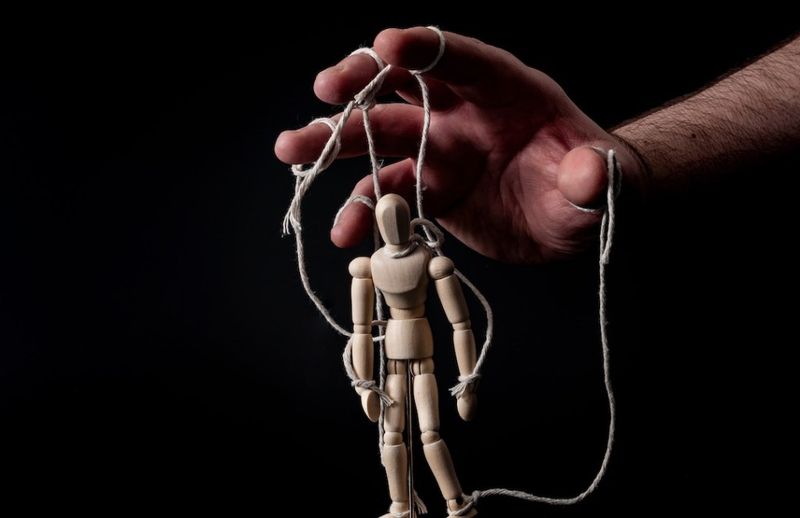Love should feel safe—not confusing, exhausting, or quietly controlling. We all crave connection, but sometimes what feels like romance can slip into something a lot less healthy (and much sneakier).
Emotional manipulation isn’t always loud or obvious. It’s those subtle, everyday moves that make you question your memory, instincts, and worth until you’re stuck in a loop you can’t name. If you’re reading this and nodding, girl, you’re definitely not alone.
I’m here to spill some much-needed tea about the ways emotional manipulation creeps in, even when everything looks picture-perfect on the outside. Let’s get real about the signs your partner might be pulling the emotional strings behind the scenes.
1. Guilt-Tripping Over Boundaries
Ever notice how you say “no” to something and suddenly the room is colder than a January morning? That little sigh, the dramatic pause, or the classic wounded-puppy face—they’re all weapons of the guilt trip. Boundaries should be respected, not treated like a personal attack.
At first, you might brush it off, telling yourself they’re just sensitive. But after the fifth or sixth time, you find yourself giving in just to keep the peace. It’s exhausting, and you end up feeling like the villain in your own story.
Your needs matter just as much as theirs. Anyone who makes you feel bad for drawing a line isn’t protecting your heart—they’re protecting their control. Healthy love is about balance, not walking on eggshells.
2. Dismissing Your Emotions
Nothing stings quite like opening up, only to be told you’re “too sensitive” or “making a big deal out of nothing.” Ugh. If every time you share your feelings, they get dismissed, the problem isn’t with your emotions—it’s with their empathy.
Over time, this kind of shrug-off can mess with your head. You start second-guessing those gut feelings and eventually, you might not even bother speaking up at all. Suddenly, you’re silently swallowing hurt just to avoid eye rolls or dramatic sighs.
Girl, your feelings are valid—even if they don’t understand them. If your partner can’t handle a real conversation, that’s on them. You deserve someone who listens, not someone who rewrites your reality.
3. Master of the Rewrite
Ever been so sure about what happened, only for your partner to spin a completely different version? Suddenly, up is down and you’re left wondering if you got it all wrong. Welcome to the funhouse mirror of emotional manipulation.
This isn’t just a bad memory—it’s a deliberate twist designed to keep you guessing. You might even apologize for things that weren’t your fault, just because their retelling sounds so convincing. It’s like living in a movie where the script changes daily.
Trust your memory. If you remember it one way and they insist it was another, notice the pattern. Real love doesn’t leave you feeling like you’re losing your mind.
4. Affection as a Prize
Some people hand out affection like it’s a reward sticker rather than a given. If hugs, kisses, or even a simple “I love you” only show up when you do what they want, that’s not love—that’s a transaction. No one should have to earn affection by following someone else’s script.
You might catch yourself thinking, “If I just do this one thing, maybe they’ll be sweet again.” That’s how you end up hustling for crumbs of attention, instead of basking in the love you deserve. Real relationships aren’t built on obedience and treats.
Affection should be consistent, not doled out for good behavior. Don’t settle for love with strings attached—you deserve more than that.
5. The Blame Game Champion
Isn’t it wild how you can start an argument about their mistake and still end up being the one to apologize? Blame-shifting is classic manipulation. You could write a whole book on the mental gymnastics it takes to keep up.
After a while, you start wondering if everything really is your fault. Spoiler: it isn’t. You become the designated scapegoat, saying sorry for things you didn’t do just to restore the peace.
Healthy couples own their slip-ups and work through them. You’re not a punching bag for someone else’s guilt. Remember—real love is about sharing responsibility, not dodging it.
6. The Isolation Game
Maybe it starts small—a snide comment about your best friend or a sigh when you plan a family visit. Before you know it, every outing feels like a negotiation. Suddenly, your circle shrinks until you’re left feeling alone, even with your partner right there.
This isn’t just jealousy or clinginess; it’s about stripping away support. Without your crew cheering you on, it’s easier for them to control the narrative at home. Friends and family keep us grounded—don’t let anyone cut those roots.
If your social life is shrinking and it’s always because of them, pay attention. You deserve love that makes room for everyone who matters to you.
7. Turning Insecurities Into Weapons
Trust is sacred. Sharing your fears should feel safe, not like handing someone ammo for the next argument. The worst is when your partner brings up your insecurities just to win a fight or make you feel small.
It’s sneaky because it often sounds like concern. But you know the difference when your private doubts get tossed back at you with a sting. Suddenly, what you trusted them with becomes a weakness.
Your secrets deserve to be kept, not weaponized. If your partner can’t handle your vulnerability with care, it says more about their character than yours. Lift yourself up—you aren’t broken or weak for having feelings.
8. The Great Gaslight
Classic line: “That never happened. You’re imagining things.” If you’ve heard that enough to start questioning your own memory, welcome to the not-so-fun world of gaslighting. This trick makes you doubt your reality until you’re chasing your own tail.
It’s not about forgetfulness. It’s about power. You end up feeling like maybe you’re just forgetful or too dramatic, but deep down you know something’s off. The more it happens, the harder it gets to trust your instincts.
Hang on to your truth. If your partner’s stories make you feel lost or crazy, it’s not because you are. It’s their control game—not your memory at fault.
9. Rushing You to Move On
Ever try to talk about a problem and get a quick, “Can’t you just get over it already?” That’s not conflict resolution—it’s emotional fast-forward. Real issues deserve real conversations, not a race to sweep everything under the rug.
This move makes you feel like a nag, so you keep quiet just to avoid being labeled “dramatic.” The truth? Pushing you to forget pain is just another way to avoid accountability. You’re left carrying the heaviness alone.
Your feelings don’t have an expiration date. Take your time and remember: healthy love doesn’t rush healing. Your pain deserves more than a hasty dismissal.
10. Love on a Roller Coaster
One day it’s breakfast in bed, the next it’s radio silence. The emotional whiplash leaves you craving their affection, constantly guessing what mood awaits. This “hot and cold” routine isn’t just confusing—it’s strategic.
Being unpredictable keeps you on your toes, always hoping for the next “good” day. It’s a power move, not a quirk. Consistency gets replaced by anxiety, and you start blaming yourself for every little shift in their attitude.
Your love life shouldn’t feel like a game of poker. You deserve steady connection, not a guessing game. If their affection feels like a roller coaster, it’s time to step off.
11. Control Disguised as Love
Have you ever heard, “I’m only doing this because I care so much”? That’s not romance—it’s control in a glittery package. Using “love” as an excuse to micromanage your choices or mood isn’t sweet. It’s sneaky.
Before you know it, simple things like what you wear, who you talk to, or how you spend your time have invisible strings attached. What looks thoughtful at first turns out to be a leash, not a gift.
Love should give you more freedom, not less. If “caring” feels heavy and suffocating, trust your gut. Real affection doesn’t come with a list of rules.
12. Trapped by Guilt
“I don’t know what I’d do without you.” Sounds sweet, right? But when it becomes a constant echo, it’s not a compliment—it’s a chain. Emotional manipulators turn their neediness into an anchor, making you feel responsible for their happiness and well-being.
Soon, leaving or even taking space feels impossible, like you’re holding someone’s entire world together with tape. That’s not love—it’s guilt. Keeping you stuck isn’t devotion, it’s a tactic.
If “I need you” starts to sound more like “You owe me,” step back. Your happiness isn’t a bargaining chip. You’re allowed to choose what’s best for you—without feeling like the villain.
13. Toxic “Truth-Telling”
“I’m just being honest” can be the start of some of the most bruising comments you’ll ever hear. There’s a huge difference between genuine feedback and using “truth” as an excuse to tear you down. If their “helpful” advice always leaves you feeling smaller, that’s a red flag.
Being told your flaws on repeat isn’t constructive; it’s cruel. Over time, you start to internalize their so-called “help” and your confidence takes a nosedive. Suddenly, you’re second-guessing things you never worried about before.
Real love lifts you up, not breaks you down for “your own good.” Criticism should leave you better, not battered. Don’t settle for mean disguised as meaningful.
14. Pushing Past Your “No”
There’s nothing charming about not taking “no” for an answer. Whether it’s about your time, your body, or your choices, pushing until you give in is not persistence—it’s pressure. You shouldn’t have to defend your right to set boundaries.
When “just this once” becomes every single time, it chips away at your confidence and your autonomy. Soon, you’re saying “yes” just to avoid another exhausting debate, and your wants get bulldozed under theirs.
Healthy love respects “no” the first time. If your boundaries feel invisible, it’s not because you’re too rigid—it’s because they’re not listening. Your consent is non-negotiable.
15. Everything’s Suddenly Your Fault
Somehow, every problem—even the ones with their name written all over them—ends up dumped in your lap. It’s a magic trick you never wanted to learn. You start apologizing for things that have nothing to do with you, just to stop another argument.
Blame isn’t love, and you’re not the fix-it fairy for someone too scared to own up. This constant fault-finding eats away at your self-esteem until you’re convinced you’re the problem. Spoiler alert: You’re not.
Accountability is a two-way street. Don’t carry the weight of someone else’s mess. You didn’t create it, and you don’t have to clean it up.
16. The Silent Treatment Freeze-Out
The silent treatment isn’t just a moody day—it’s a form of punishment. Suddenly, you’re walking on eggshells, desperate for even a crumb of attention or a single word. It’s more about power than peace and definitely not about fixing anything.
You might scramble to apologize or guess what you did wrong, but the rules keep changing. This emotional freeze-out is meant to keep you anxious and off balance. It works, too, because silence can be louder than any argument.
Healthy communication is key, not cold war tactics. You deserve to be talked to, not frozen out. Ice belongs in drinks, not relationships.
17. Emotional Exhaustion With No Reason
Ever hang up the phone or walk out of a room feeling completely zapped—like you ran a marathon without moving? That’s emotional exhaustion, and if you can’t put your finger on why, manipulation might be lurking in the shadows.
This kind of tiredness isn’t fixed by a nap or a snack. It’s the result of constant second-guessing, apologizing, and tiptoeing. Over time, your confidence fades and your joy goes missing.
You deserve to feel energized by love, not drained by it. Pay attention to how you feel after each interaction. If you’re always left empty, it’s not you—it’s the dynamic that needs to change.


















